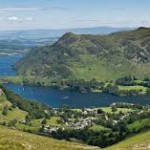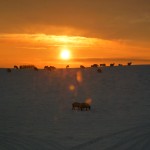Our Viking Heritage
When I was eating in the Gate at Yanwath, I heard a lady at the next table remark loudly, “of course we are all Vikings here.” I looked up. And everyone at her table nodded, unsurprised. But two hundred years ago, Cumbrians would have been surprised to learn they had Norse ancestors. One of the very first clues was picked up by the editor of the Westmorland Gazette, who heard a woman imploring her naughty child in 1819, to ‘Come its ways, then, and get its patten”. It was only because his brother had been imprisoned by the Danes for eighteen months that he recognised she was using the Danish word for ‘breast’.
Victorian scholars began the process of recording in detail (through Cumbrians studying Icelandic, or Norwegians visiting Coniston) just how many Scandinavian words survived in place-names – fell, dale, beck, gill and the rest. They began to look more carefully at eroded figures on Cumbrian crosses. And by the end of the nineteenth century, some traditional Cumbrian dialects began to seem closer to old Norse than modern English. Finally, ten years ago, Penrith was revealed to have “the highest concentration of Scandinavian DNA in England”. For more than a quarter of us, it seems, our – times 40 – male ancestor was from Norway.
And yet, this had never been how old Cumbrian historians had described our area. Roman yes, part of the Anglo-Saxon Kingdom of Northumbria, perhaps even partly Scottish, or, for the pedantic, part of the Welsh-speaking Kingdom of Cumbria. But nothing in the historical record, and very little dug from the ground, suggested this had been a very Norse area. And yet it was. Sometime, at least a thousand years ago, Scandinavians settled almost every valley in the Lakes from Wasdale (Vatns-dalr or “valley of the water) to ‘Ullswater (Ulf’s water).
They left no records – may in fact have been illiterate – and we have to rely on much later sagas from Iceland to even sense what they may have been like. It seems certain, however, that the Norse who came here were no longer only ‘Viking’ pirates: although they may have continued seasonal raiding. They came here to settle – bringing their families, their livestock. They took over small upland farms, kept pigs, and focused on cattle and sheep – possibly Herdwick sheep. They coppiced ash-trees to feed their livestock, and they built dry-stone walls. Their society looks almost like an early democracy: possibly like other Norse communities reaching decisions through assemblies on mounds called ‘thing-mounts’. But they also kept slaves. If they were like their Icelandic cousins they could be quick to take offence, fiercely independent, obsessively litigious (suing their neighbours over land boundaries, grazing rights, and inheritance) and fond of killing each other.
Their apparently isolated, parochial society was connected to the broadest international culture of its day. All their ancestors had sailed from Scandinavia around the Orkneys. Their contemporaries and relatives had fought on the coast of Libya, had served in modern Istanbul, set up dynasties in Kiev, and even established a small settlement in North America. They came to Cumbria in enough force to obliterate almost all the earlier place-names and replace them with their own Norse names. There must have been ‘original’ inhabitants of Cumbria, who had occupied these valleys before them, but only the smallest trace remains. Unlike the British or English locals, these immigrants were not Christian.
They took their names from Norse mythology: from Odin and his sacred bird the raven (‘Oddendale, Crosby Ravensworth). They believed, it seemed, when they saw a Cumbria rainbow stretching over the fell that they were gazing at a bridge, at whose end lay the home of the Gods. They watched the sun cross the sky, believing its light was being dragged by demi-gods, galloping in terror from wolves at their heels; and that the wolves would eventually catch the sun and plunge the world into darkness. They expected that their society, the world, and the Gods themselves – would all one day be wiped out, in a great apocalypse.
We can still see their traces around us. Their God ‘Loki’ is carved – bound in the entrails of his children – on a stone in Kirkby Stephen church; their sacred Ash tree – Yggdrasil – on a sandstone pillar in Dearham church; and the world serpent in Penrith churchyard. These stones were probably used by Christian missionaries to convince the Norse that Christianity was not very different to their old beliefs. (Loki and the serpent were just versions of the Devil perhaps, the beautiful and peaceful Baldr was Jesus, and the ash tree was the cross).
But today they should remind us not of similarities, but of deep and startling differences. It is tempting to get round the strangeness of the past, by making it simply glamorous. You could point out, for example, to the lady who said ‘we are all Viking’ – that, her 41 times great-grandfather might seem familiar: a tall dalesman, with an upland farm, a Herdwick flock, behind his dry-stone wall; but that the silver on his brooch came from Islamic coins, minted in Samarkand, the bangles recorded the number of enemies he had killed, the hammer round his neck was an amulet of Thor. But it is easier to describe his jewellery than his mind: or to inhabit his values, his honour, and sense of justice. We should hold back from claiming to understand. Why did such great care go into depicting Thor and the final apocalypse of the Gods along the fourteen foot shaft of the Gosforth cross? What does it mean to believe, like those Norse ‘upland farmers’, that if that if you die in bed, instead of battle, you go to hell?











